 Important Notice:
Important Notice:
Online registration is now CLOSED for this conference. You can arrive up to one hour early to register at the door.
Presented by Margaret Wehrenberg, Psy.D. and John P. Forsyth,Ph.D. and Jamie R. Forsyth,Ph.D. and Ronald Siegel, Psy.D. and Stan Tatkin, Psy.D. and Eboni Webb, Psy.D., HSP and Lynn Lyons, MSW, RSW and Janina Fisher, Ph.D. and Jeff Riggenbach, Ph.D. and Roy D. Steinberg, Ph.D. and Gabor Maté, M.D. and Eric Gentry, Ph.D. and Alan S. Bloom, Ph.D.
Monday, November 26, 2018 – Wednesday, November 28, 2018 | Richmond, bc
Online registration is now CLOSED for this conference. You can arrive up to one hour early to register at the door.
Monday, November 26, 2018 – Wednesday, November 28, 2018
9:00 am – 4:00pm
Executive Hotel Vancouver Airport
7311 Westminster Hwy
Richmond, BC V6X 1A3
phone: 604.278.5555
Dear Colleague,
To celebrate the 20th anniversary of Jack Hirose and Associates, we are launching our largest conference to date with an entirely new format. The Canadian Mental Health Summit: Advanced Interventions and Strategies for Frontline Professionals will be held in Richmond, BC, November 26 – 27, 2018. This conference will bring together 13 internationally renown experts, for 12 full day workshop options. This new evolution of our conferences is our most ambitious endeavour. We are sparing no expense to bring to you the leading industry professionals on the most relevant topics focusing on mental health.
Our conferences have trained over 10,000 frontline professionals. We have assembled your feedback and addressed the following concerns. Full day workshops allow in-depth training and more time to focus on strategies and techniques. You will have the option to select your presenter and topic for each day. By pre-selecting your workshop we can guarantee sufficient seating. Take advantage of our new super early bird pricing for our lowest individual 3-day rate. Register before June 15, 2018 to save up to $70 on your registration fees. Our goal is to bring to you a custom tailored 3 day conference experience unlike ever before.
We hope you will join us as we address imperative topics such as: Acceptance and Commitment Therapy, Depression, Compassion Fatigue, Psychopharmacology, Alzheimers and Dementias, Couples Therapy, Mindfulness, Dialectical Behavioural Therapy, Addiction, Anxiety, Personality Disorders and Trauma-Informed Stabilization Treatment. I look forward to seeing you the conference!
Regards,
Jack Hirose, M.A.
Conference Director
Depression Management Techniques
Workshop #1 – The 10 Best-Ever Depression Management Techniques by Dr. Margaret Wehrenberg, Psy.D., Curriculum Development Director for Candeo’s online Depression and Anxiety Program
Acceptance and Commitment Therapy (ACT)
Workshop #2 – Harnessing the Transformative Power of Mindful Acceptance and Commitment (ACT) by Dr. John P. Forsyth, Ph.D., Anxiety Disorders Research Program at the University of Albany. Dr. Jamie R. Forsyth, Ph.D., clinical psychologist, clinical supervisor and trainer
Psychopharmacology
Workshop #3 – Psychopharmacology for Mental Health Professionals by Dr. Alan S. Bloom, Ph.D., Professor of Pharmacology and Toxicology at the Medical College of Wisconsin
Compassion Fatigue
Workshop #4 – Compassion Fatigue and Burnout by Dr. Eric Gentry, Ph.D., Co-director of the International Traumatology Institute at the University of South Florida
Mindfulness
Workshop #5 – New Frontiers in Mindfulness in Psychotherapy: Tailoring the Practice to the Person by Dr. Ron Siegel, Psy.D., Assistant Professor of Psychology, part-time, at Harvard Medical School and serves on the Board of Directors and faculty of the Institute for Meditation and Psychotherapy
Couples Therapy
Workshop #6 – A Psychological Approach to Couples Therapy (PACT) by Dr. Stan Tatkin, Psy.D., Clinical practice in Southern California, teaches at Kaiser Permanente, assistant clinical professor at UCLA, developer of Psychological Approach to Couple Therapy (PACT)
Dialectical Behaviour Therapy (DBT)
Workshop #7 – Dialectical Behaviour Therapy Skills Training for Mental Health Professionals by Dr. Eboni Webb, Psy.D., Owner Kairos Mental Health Cooperative, advisor to the Dialectical Behavior Therapy National Certification and Accreditation Association
Addictions
Workshop #8 – Taming the Hungry Ghost by Dr. Gabor Mate, M.D., International speaker and bestselling author, co-founder of Compassion for Addiction, a new non-profit that focuses on addictions
Anxiety
Workshop #9 – Help Your Anxious Clients: Concrete Strategies for Treating Anxiety in Adults by Lynn Lyons, MSW, RSW, Internationally recognized psychotherapist, author and speaker
Trauma
Workshop #10 – Trauma-Informed Stabilization Treatment (TIST): A New Approach to Addictions, Eating Disorders, Suicidality, and Self-Injurious Behaviour by Dr. Janina Fisher, Ph.D., Clinical psychologist and instructor at the Trauma Centre in Boston; faculty member of the Sensorimotor Psychotherapy Institute and former instructor Harvard Medical School
Personality Disorders
Workshop #11 –Treatment and Management of Personality Disorders: The Challenge of the Hidden Agenda by Dr. Jeff Riggenbach, Ph.D., Diplomat with the Academy of Cognitive Therapy and President of the CBT Institute of Oklahoma
Aging Brain
Workshop #12 – The Aging Brain: The Assessment, Treatment, and Interventions of Alzheimer’s Disease and Other Dementias by Dr. Roy D. Steinberg, Ph.D., Gero-psychologist, author and national lecturer on the assessment and treatment of individuals with Alzheimer’s
Clinical Professionals: All mental health professionals including, but not limited to Clinical Counsellors, Psychologists, Psychotherapists, Social Workers, Nurses, Occupational Therapists, Hospice and Palliative Care Workers, Youth Workers, Mental Health Workers, Addiction Specialists, Marital & Family Therapists, Speech Language Pathologists, Vocational Rehabilitation Consultants, School Counsellors, Behaviour Specialists, Rehabilitation Consultants, Geriatric Specialists, and all professionals looking to enhance their therapeutic skills.
9:00am - 4:00pm November 26, 2018
Depression is painful. Ruminating thoughts, lethargy, and increasing alienation from others create a negative internal and external environment. Those symptoms actively interfere with carrying out basic demands of daily life. While depression is one of the most common mental health disorders, there are different causes. Treatment options run a gamut that includes new technologies to directly affect brain activity, advances in stress management, improved tools to relieve the impact of childhood trauma and focus on developing resilience.
How does a therapist know where to get started in the treatment? In this seminar, identifying four different kinds of depression, you will master 10 strategies to jump start therapy and provide immediate relief of symptoms. You will be able to set the stage for longer term recovery.
LEARNING OBJECTIVES:
OUTLINE:

Margaret Wehrenberg, Psy.D., is a clinical psychologist, author, and international trainer. She is a practicing psychotherapist and coaches professionals for anxiety management. Margaret has been a trainer of therapists for 25 years, and she is a sought-after speaker for continuing…
More information: margaretwehrenberg.com
9:00am - 4:00pm November 26, 2018
Acceptance and mindfulness-based practices are rapidly making their way into mental health care, medicine, and society both to alleviate human suffering and nurture psychological health and wellness. This body of work also offers a fresh perceptive on psychological suffering and a set of powerful clinical strategies that support meaningful life changes. In this workshop, we will learn about one particular approach and set of practices based on Acceptance and Commitment Therapy (or ACT, said as one word).
ACT is a newer third-generation evidence-based behaviour therapy that balances mindfulness and acceptance processes with commitment and behaviour change processes to (a) weaken the unhelpful influence of thoughts and emotional avoidance in guiding actions, while (b) promoting greater experiential and psychological flexibility in the service of (c) valued ends. It is both a form of therapy and an approach to living well, with evidence showing that it is useful for many forms of psychological and emotional suffering. In short, ACT teaches clients how to be with their hurts and do what works – to live well, richly, and meaningfully, without first having to defeat sources of emotional and psychological pain.
This 1-day workshop will introduce ACT, both as a model and intervention technology, and illustrate its use across a broad set of problem areas that are commonly seen in mental health settings (e.g., anxiety, depression, anger). The workshop will include a rich mix of didactic teachings, live and video demonstrations, and practical experiential exercises that will be done individually, in dyads, and small groups. Clinical worksheets and other practical tools will be provided.
LEARNING OBJECTIVES:
Participants will learn how to:
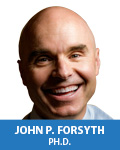
John P. Forsyth, Ph.D. is an internationally recognized author, speaker, researcher, and trainer in the use of Acceptance and Commitment Therapy (ACT) and practices that cultivate mindfulness, loving kindness, and compassion. For over 20 years, his work has focused on…
More information: https://www.drjohnforsyth.com/

Jamie R. Forsyth, Ph.D. is an active and gifted clinician and clinical supervisor, with extensive expertise in the use and application of Acceptance and Commitment Therapy (ACT) with severe forms mental illness (e.g., psychosis and personality disorders) and forms of…
More information: https://www.drjohnforsyth.com/
9:00am - 4:00pm November 26, 2018
Most clients with DSM-5® diagnoses are being treated with a combination of psychological and pharmacological treatments. Newer drugs are being developed to treat mental disorders based on a better understanding of neurobiological contributions to mental disorders and the latest pharmacological research. To provide appropriate services, you are expected to have a thorough understanding of these common and complex issues. As a mental health professional, keeping up-to-date is essential.
This seminar will update and increase your knowledge of:
• Neurobiological underpinnings of major DSM-5® diagnoses
• Effects and side effects of drugs used to treat these diagnoses
• Responsibilities of the non-prescribing therapist to clients taking psychiatric medication
Specifics of the pharmacological treatment and drugs of choice for Depressive, Bipolar, Schizophrenia Spectrum, Anxiety, OCD, Sleep-Wake, ADHD and Neurocognitive disorders will be presented. Unique to this seminar is information on the common types of psychotherapeutic drugs and other drugs that are abused, and methods for prevention and early detection. Throughout the day, representative case studies will generate discussion and examination of the latest drug treatment for DSM-5® disorders. You will leave this seminar with knowledge and confidence regarding effective and safe application of pharmacological drugs.
Margaret L. Bloom, Ph.D. will provide a brief portion of the Psychopharmacology presentation regarding the role of prescribing and non-prescribing mental health professional.
LEARNING OBJECTIVES:
OUTLINE:
Psychopharmacological Foundations
Neurobiology of Behavior, Mental Illness & Psychotherapeutic Drug Action
Your role in combined psychological & pharmacological treatments
Drugs Used in the Treatment of DSM-5® Mental Disorders
Schizophrenia Spectrum Disorders
Depressive Disorders
Bipolar Disorders
Anxiety, Obsessive-Compulsive & Sleep-Wake Disorders
Attention-Deficit/Hyperactivity Disorder & Neurocognitive Disorders (Dementia)
Prescription Drug Abuse
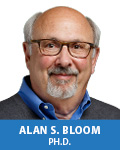
Alan S. Bloom, Ph.D., is professor of Pharmacology and Toxicology at the Medical College of Wisconsin where he teaches psychopharmacology to medical students and neuroscience graduate students. He earned a dual Ph.D. in psychology and pharmacology and consults regularly with psychiatrists…

Margaret (Peggy) L. Bloom, Ph.D., Professor Emerita, Counsellor Education and Counselling Psychology, Marquette University, Milwaukee, Wisconsin, is a licensed psychologist, national certified counsellor (NCC) and elected fellow of the American Psychological Association and the American Educational Research Association. Peggy is…
9:00am - 4:00pm November 26, 2018
This seminar has been identified by hundreds of professionals as life changing, essential, and exhilarating, Join Dr. Eric Gentry, a recognized leader in the area of compassion fatigue, and learn evidence-based compassion resiliency and prevention skills drawn from the Accelerated Recovery Program for Compassion Fatigue and Burnout. Learn self-regulation-practical skills that are critical to your being maximally effective with your clients and improving treatment outcomes. For the past 30 years, research has been steadily accumulating to demonstrate that caring has its costs. We now know that working with others who suffer from mental illness, addiction, pain, abuse, social deprivation and trauma have negative effects on the caregivers many of which are potentially debilitating. Compassion fatigue has been identified as a cause for symptoms of depression, anxiety, chemical dependency, eating disorders, relation problems, psychological disorders, and suicide among professionals. If practitioners know how to effectively prevent and conquer stress, burnout, and compassion fatigue, they become more effective and productive.
In this workshop, you will learn powerful tools (the anti-bodies) that are critical for professional resiliency and integrate them into your practice immediately. Additionally, you will leave with techniques to teach and help your clients improve their lives. This seminar integrates the latest research and practice wisdom to help you reclaim the satisfaction, hope and inspiration for professional care giving.
LEARNING OBJECTIVES:
OUTLINE:
Welcome: Getting in tune with Compassion Fatigue – Opening Exercise
The Problem: Compassion Fatigue Etiology & Symptoms
The Solution: Compassion Fatigue Resiliency
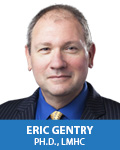
Eric Gentry, Ph.D., is an internationally recognized leader in the field of disaster and clinical traumatology, having trained thousands of professionals and paraprofessionals worldwide in the treatment of traumatic stress. His doctorate is from Florida State University where he studied…
9:00am - 4:00pm November 27, 2018
Mindfulness-based psychotherapy is the most popular new treatment approach in the last decade—and for good reason. Mindfulness practices hold great promise not only for our own personal development, but also as remarkably powerful tools to augment virtually every form of psychotherapy. Mindfulness is not, however, a one-size-fits-all remedy. Researchers are now differentiating the effects of focused attention, open monitoring, loving-kindness, compassion, and equanimity practices. Practices need to be tailored to fit the needs of particular individuals—and this workshop will show you how.
We will explore seven important clinical decisions to consider when deciding when and if to introduce different practices into treatment of individuals with different needs. Once you understand the components of mindfulness practices and how they work to alleviate psychological distress, you’ll be able to creatively adapt them to meet the needs of diverse people and conditions, including those with unresolved trauma histories. You’ll learn how to use mindfulness practices to help resolve anxiety, depression, and other disorders, gaining practical knowledge and skills that will take your practice of mindfulness-based psychotherapy to the next level.
LEARNING OBJECTIVES:
OUTLINE:
Mindfulness: What Is It Really?
How Mindfulness Works
Fit the Practice To The Person
Working with Depression: Entering the Dark Places Together
Befriending Fear: Treating Anxiety Disorders
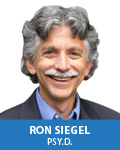
Ronald D. Siegel, Psy.D. is an Assistant Professor of Psychology, part-time, at Harvard Medical School, where he has taught for over 35 years. He is a long-time student of mindfulness meditation and serves on the Board of Directors and faculty…
9:00am - 4:00pm November 27, 2018
PACT helps couples move towards secure functioning by integrating early attachment theory, arousal regulation and neuroscience into intervention. A Psychobiological Approach to Couples Therapy (PACT) is a new and innovative approach to couple work developed by Dr. Stan Tatkin, Clinical Psychologist and Marriage and Family Therapist (MFT) and is quickly gaining a reputation as a highly effective intervention for couples deemed as complex. PACT integrates attachment theory, arousal regulation and neuroscience into assessment and formulation of the couple relationship and interventions that help the couple move towards secure attachment functioning.
This workshop gives an overview of the PACT model and principles through a combined didactic and multimedia delivery of information, group discussion, experiential exercises, clinical video presentations, case consultation, and live case enactments.
We will explore how early attachment patterns are somatically imprinted onto the development of the brain and nervous system and how to interpret the consequent somatic responses. The PACT methodology utilizes a bottom-up versus a top-down approach to psychotherapy focusing on very fast, often surprising interventions in order to access implicit systems as revealed in micro- expressions and micro-movements in the face and body, respectively.
LEARNING OBJECTIVES:
OUTLINE:
| 9:00am – 10:30am | Secure functioning couples Automatic brain (memory, state, perception, communication) Arousal regulation & attachment |
| 10:30am – 10:45am | Break |
| 10:45am – 12:00pm | Basic interview techniques Demonstrations Demonstrations |
| 1:15pm – 3:00pm | Interventions |
| 3:00pm – 3:15pm | Break |
| 3:15pm – 4:00pm | Demonstrations Case examples from audience Q & A |
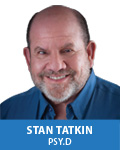
Stan Tatkin, Psy.D. is the author of Wired for Love and Your Brain on Love, and coauthor of Love and War in Intimate Relationships. He has a clinical practice in Southern California, teaches at Kaiser Permanente, and is an assistant clinical professor at UCL A. Tatkin developed a…
9:00am - 4:00pm November 27, 2018
Dialectical Behavior Therapy (DBT) is a highly effective form of treatment for clients with Borderline Personality Disorder (BPD). However, many of these individuals have rarely developed life skills to build a proactive and responsive life versus a defensive and reactive one. Dr. Eboni Webb will introduce a holistic approach to treatment and will expand on key concepts including skills acquisition, daily practice, and generalization. These skills are critical for our clients to develop an effective interdependent adult life. Dr. Webb will provide a brief discussion of DBT and its relationship to the Biosocial model, the neurological impact of trauma on the developing brain and how to address specific diagnoses via the skills. She will discuss the importance of integrating DBT skills at the earliest point of treatment and utilizing skills as a foundation for life
LEARNING OBJECTIVES:
OUTLINE:
Neurobiological Building Blocks
Creating the Learning Container
The Foundational Skills: Mindfulness & Dialectics
Naming to Tame: Emotion Regulation
Thriving in a Crisis: Distress Tolerance & Self-Compassion
Connection in Community: Interpersonal Effectiveness

Eboni Webb, PsyD, HSP, earned her Doctorate in Clinical Psychology from the Minnesota School of Professional Psychology (MSPP). She began her clinical work as assistant clinical director and program director at Mental Health Systems, PC (MHS), one of the largest providers…
9:00am - 4:00pm November 27, 2018
For twelve years Dr. Maté was the staff physician at a clinic for drug-addicted people in Vancouver’s Downtown Eastside, where he worked with patients challenged by hard-core drug addiction, mental illness and HIV, including at Vancouver Supervised Injection Site. In his most recent bestselling book In The Realm of Hungry Ghosts, he shows that their addictions do not represent a discrete set of medical disorders; rather, they merely reflect the extreme end of a continuum of addiction, mostly hidden, that runs throughout our society. In The Realm Of Hungry Ghosts draws on cutting-edge science to illuminate where and how addictions originate and what they have in common.
Contrary to what is often claimed, the source of addictions is not to be found in genes, but in the early childhood environment where the neurobiology of the brain’s reward pathways develops and where the emotional patterns that lead to addiction are wired into the unconscious. Stress, both then and later in life, creates the predisposition for addictions, whether to drugs, alcohol, nicotine, or to behavioural addictions such as shopping or sex.
Helping the addicted individual requires that we appreciate the function of the addiction in his or her life. More than a disease, the addiction is a response to a distressing life history and life situation. Once we recognize the roots of addiction and the lack it strives (in vain) to fill, we can develop a compassionate approach toward the addict, one that stands the best chance of restoring him or her to wholeness and health.
LEARNING OBJECTIVES:
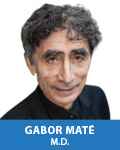
Gabor Maté (pronunciation: GAH-bor MAH-tay) is a retired physician who, after 20 years of family practice and palliative care experience, worked for over a decade in Vancouver’s Downtown East Side with patients challenged by drug addiction and mental illness. The…
More information: drgabormate.com
6:30pm - 7:30pm November 27, 2018
Led By Anita Cheung, Co-Founder and Brand Director at Moment Meditation
Anita is a yoga therapist and meditation teacher who has been teaching since 2012. She is passionate about mental health and helping you feel at home in your body. Expect 60 minutes of a gentle flow yoga class with good people and good music. Beginner-friendly. Please bring your own mat and towel.
This event is for conference attendees only. To register, please select the yoga session during registration. This session is complimentary, space is limited. Names will be checked at the door.
9:00am - 4:00pm November 28, 2018
Anxiety disorders take a tremendous toll on individuals and families. By demanding certainty and comfort in rather dramatic fashion, anxiety grabs control in a way that interrupts lives, promotes avoidance, and leads to depression and physical issues. Anxiety runs in families, with children who are raised by a parent with an anxiety disorder being six to seven times more likely to develop anxiety themselves, thus interrupting this generational pattern of anxiety is critical.
This workshop will focus on concrete, strategic interventions that move clients out of the “content trap” of the anxiety disorder and toward a process that interrupts anxiety’s predictable cognitive, behavioural, and physiological patterns. Participants will learn how to immediately and actively engage clients in active treatment using psycho-education and strategic homework assignments that move clients toward uncertainty (a key to successful treatment), address the use of safety crutches and avoidance, and promote the skills of differentiation and problem solving to combat the global avoidance style of anxious people.
LEARNING OBJECTIVES:

Lynn Lyons, MSW, RSW, is an internationally recognized psychotherapist, author, and speaker with a special interest in interrupting the generational patterns of anxiety in families. Her skill-based approach to anxiety focuses on the need to teach families about HOW anxiety works…
9:00am - 4:00pm November 28, 2018
Childhood trauma, neglect, and disorganized attachment leave individuals with a legacy of overwhelming memories, a fragmented sense of self, and a compromised nervous system that impairs their capacity to experience and tolerate affect. Unaware that their intense feelings and reactions represent non-verbal implicit memories held by fragmented parts of the personality, they resort to desperate measures: addictive and self-harming behaviour to numb the body or increase hyper vigilance, suicidal ideation to restore a sense of control over their lives, and easily activated fight/flight responses to hurt, separation, or rejection.
The therapist is left with a quandary: how do we treat the underlying trauma when the client is unstable or unsafe, living from crisis to crisis, or caught in a revolving door of hospitals and treatment approaches? How do we acknowledge what has happened without opening up too much? The Trauma-Informed Stabilization Treatment (TIST) model was developed to provide some hopeful answers to these challenges. Based on theoretical principles drawn from the neuroscience research on trauma and structural dissociation theory, TIST offers a treatment approach that combines mindfulness-based interventions, Sensorimotor Psychotherapy, and Internal Family Systems techniques to address the challenges of treating clients with a wide range of diagnoses, including complex PTSD, borderline personality, bipolar disorder, addictive and eating disorders, and dissociative disorders.
LEARNING OBJECTIVES:
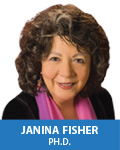
Janina Fisher, Ph.D. is a licensed clinical psychologist and a former instructor, Harvard Medical School. An international expert on the treatment of trauma, she is an Advisory Board member of the Trauma Research Foundation. Dr. Fisher is the author of…
9:00am - 4:00pm November 28, 2018
Individuals with personality disorders have long been considered the most challenging clients presenting in the clinical setting. Many patients lack motivation, most begin with poor insight, and some have such deeply engrained dysfunctional beliefs, unhealthy coping skills, and destructive behavioral patterns that continue to frustrate providers, family members, and consumers alike. Many professionals even continue to view them as untreatable.
However, there is hope. Emerging research suggests this is simply not the case. DBT, CBT, and Schema Therapy have paved the way in pioneering new attitudes and outcomes related to treating these conditions.
Join leading exert in the field of personality dysfunction Dr. Jeff Riggenbach for this enjoyable training chock full of the latest research, techniques, and practical strategies. This powerful workshop will give you a new ability to help struggling individuals deal with issues related to self-injurious behaviors, multiple suicide attempts, frequently hurt feelings, intense and unpredictable mood swings, substance use, angry outbursts, toxic relationships and other problems that impair their ability to function in society. Leave this day long training with an integrated DBT/CBT /Schema Informed approach to treating these cases and giving clients with even the most complex needs a life worth living.

Jeff Riggenbach, Ph.D. is a best-selling and award winning author who has earned a reputation as an international expert in CBT and personality disorders. Over the past 20 years he has developed and overseen CBT-based treatment programs for Mood disorders,…
9:00am - 4:00pm November 28, 2018
How to better assess, treat and prevent Alzheimer’s Disease and other dementias.
Dr. Steinberg’s dynamic and engaging workshop will inform you about the latest interventions, medications and preventative treatments for Alzheimer’s Disease and other dementias. Through his expertise, learn applicable strategies like how to accurately diagnose Alzheimer’s disease and how to treat, care for and inform adult patients and their caregivers. Understand the cognitive implications of the aging process and its effects. Gain insight into pathological changes and functional manifestations specific to Alzheimer’s disease and other dementias. Learn how to differentiate between dementias including Alzheimer’s disease, Vascular Dementia, Parkinson’s disease, Frontotemporal Dementia and Lewy Body Dementia.
Ultimately, return to your practice fully-informed and ready to apply interdisciplinary approaches in your evaluation and treatment of Alzheimer’s patients and their caregivers.
WALK AWAY WITH:
LEARNING OBJECTIVES:
OUTLINE:
Mental health evaluation
Cognitive Disorder and ‘forgetfulness’
Diagnostics of dementing conditions
Cognitive assessment tools
Differentiate dementia and depression
Psychopharmacology
Behavioral Interventions
combativeness, refusing ADL care
Working with Caregivers at Home
Ethics
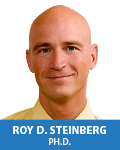
Roy D. Steinberg, PhD, a gero-psychologist with over 22 years of experience, concentrates his work on diagnosing and facilitating treatment of individuals with Alzheimer’s disease and other forms of dementia. He has lectured nationally on the assessment and treatment of individuals…
| Registration | Super Early Bird Fee | Early Bird Fee | Regular Fee |
|---|---|---|---|
| Individual 1 Day Enrollment | -- | $229 | $249 |
| Individual 2 Day Enrollment | -- | $409 | $429 |
| Individual 3 Day Enrollment | -- | $599 | $619 |
| Group 3-7 | -- | $579 | $599 |
| Group 8-14 | -- | $559 | $579 |
| Group 15+ | -- | $539 | $559 |
| Full-Time Student | -- | $539 | $559 |
| -- |
For more information on Student Rates, click here
For more information on Group Rates, click here
Afternoon Concurrent Sessions: no pre-registration required. For more information, click here
Fees do not include applicable taxes (5% GST).
Early bird cutoff date: November 22, 2018
The early bird date has passed. Regular rates apply.
Please review our Registration Terms and Conditions for information on our cancellation policy, payment policies, rebates, and more. You must agree to our Terms and Conditions to register for a workshop or conference.
Register Online Download Registration Form (.PDF) Register your Group
All brochures and forms are provided in .PDF format.
If you are unable to open our files, we recommend downloading Adobe Reader for free.
7188 Westminster Hwy, Richmond, BC V6X 1A1
phone: 604.207.9000
Our rates:
To make a reservation, please call 604.207.9000.
1088 Burrard Street, Vancouver, BC
phone: 604.331.1000
website: https://www.marriott.com/hotels/travel/yvrws-sheraton-vancouver-wall-centre/
Our rates:
* Please check back at a later time as this information will be updated when corporate/group rates are secured.
Jack Hirose & Associates is approved by the Canadian Psychological Association to offer continuing education for psychologists. Jack Hirose & Associates maintains responsibility for the program.
† The Alberta College of Social Workers (ACSW) and the Newfoundland and Labrador Association of Social Workers (NLASW) accept CPA-approved CEUs.
* Participants will receive a certificate of completion after every workshop. Workshops are pre-approved for 5.5 or 6 credits per day unless otherwise specified.
Please check back closer to the conference date for more information.
There are no related events at this time.